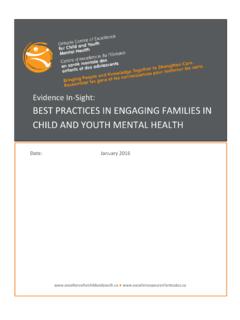Transcription of A Health System Guide to Engaging Millennial Health …
1 A Health System Guide to Engaging Millennial Health Consumers with Marketing Campaign StrategyEngaging Millennial Healthcare Consumers |2A Health System Guide to Engaging Millennial Health Consumers with Marketing Campaign StrategyTable of ContentsIntroduction 3A Millennial Selfie 5 Decoding Millennials 9 Case Studies 14 Conclusion 19 Introduction3 Engaging Millennial Healthcare Consumers |4 They re Health conscious and fitness savvy1. They re deeply committed to longevity, with more than 95 percent considering Health man-agement a primary concern and 83 percent willing to invest heavily in personal wellness services2.
2 With approximately 63 percent in a recent study3 describing themselves as currently in the market for a new healthcare provider, mil-lennials (ages 18-35) may represent the perfect storm of immediate opportunity, buyer motiva-tion, and long-term market potential for Health - care brands. Yet designing marketing campaigns for a generation fond of debunking brand claims and adept at avoiding online exposure to conventional ads is a potential minefield of failed messaging, lost ROI, and audience the most obvious saboteurs of healthcare marketing a lack of meaningful social presence, an over reliance on dated or unanchored metrics is relatively simple for experienced marketers.
3 Understanding millen-nial purchasing behaviors, however, requires a map of their complex, and often contradictory, thinking on wellness, healthcare, and the indus-try itself. This Guide will help you understand key factors which motivate Millennial consum-ers to engage with and ultimately choose a healthcare service , BrandZ Top 100 Most Valuable Global Brands Report 20162 Lindsay Drucker Mann, The Millennial Impact Study 2015, Goldman Sachs3 The State of Consumer Health - care : A Study of Patient Expe-rience, GE Healthcare Camden Group, 2016A Millennial Selfie: Who they say they are and why they may ignore your campaign5 Engaging Millennial Healthcare Consumers |61.
4 They re All Good Millennials self-define healthcare, and this often minimizes the value of engagement with traditional medical tend to believe that their mainte-nance of a positive mental state, intelligent food choices, and a reasonable work-life balance2 are the principal determinants3 of sustained physi-cal Health and longevity, with healthcare basics like regular checkups with physicians seen as options, rather than necessities. Millennials define healthcare3 as a subset of wellness-ori-ented practices which may include self-di-rected activities such as exercise and medita-tion rather than exclusively institutionalized services.
5 In 20154, a study by The Cassandra Report showed that 80 percent of millennials were spending one-fourth of their disposable income on holistic wellness related products4 and services, such as acupuncture and yoga instruction, viewing their use as an alternative to visiting traditional healthcare providers. The success of your marketing strategy requires that your brand messaging complements, rather than detracts from, millennials unconventional concept of millennialsspend one-fourth of their disposable income on holistic wellness related products2 Lindsay Drucker Mann, The Millennial Impact Study 2015, Goldman Sachs3 The State of Consumer Health - care : A Study of Patient Expe-rience, GE Healthcare Camden Group, 20164 The Spring / Summer 2015 Cassandra Report: Mind, Body, Soul, Millennial Healthcare Consumers |72.
6 They re So Over It Millennials are brand skeptics, distrustful of pos-itive claims made in traditional advertising and immune to marketers bids to stoke brand trust through compelling millennials, a campaign worthy of engage-ment5 is transactional; offering in exchange for their attention jargon-free, succinct infor-mation on goods and services with a clear line drawn between their unique lifestyle needs and a brand s value proposition. Legacy brand status matters far less to millennials than positive inde-pendent consumer reviews on social platforms, and most 60 percent 5 are unmoved by celeb-rity or expert endorsements when choosing a healthcare service or healthcare-related prod-ucts.
7 Getting past your audience s native skepti-cism necessitates that the prerequisites of mil-lennial campaign engagement transparency, relevance, and informativeness are at the core of every campaign, regardless of millennialsare unmoved by celebrity or expert endorsements when choosing a Health care service5 Harris Poll, Millennials: Extreme Expectations, May, 2016 Engaging Millennial Healthcare Consumers |83. They re already phubbing you on social platformsIf millennials ignore friends sitting next to them to post on Instagram, they re likely to ignore a poorly targeted mobile ad as banner ads on social media even those employing a catalogue of gimmicks such as the heavy use of generational colloquialisms are unwelcome5, being viewed by millennials as intrusive and even creepy when used in concert with an ad retargeting campaign.
8 This disdain for conventional ads has driven as many as 70 percent6 of millennials to download software ad-blockers to phub (ignore an interruption to focus on digital content) even the most interest-ing ad creative. A campaign that resonates will need to do more than blend seamlessly with social content; millennials want an enhance-ment to their user experience, one offering per-tinent, evergreen information that lasts beyond its most-loved millennialsdownload software ad-blockers6 Anatomy Media / EMarketer Survey US Millennial Users Who Use an Ad Blocker, July Poll, Millennials: Extreme Expectations, May, 2016 Decoding Millennials:An identity primer9 Engaging Millennial Healthcare Consumers |10By 2025, seventy-five percent of the global work-force will have been born after 1981.
9 Millennials will, as they settle into careers, transition into parenthood, and enter middle age, also stand as the world s largest and primarily untapped healthcare services consumer base. Decoding the patchwork of identities and values which drive Millennial brand adoption will be a critical element of your Health System s marketing strat-egy for the next two decades. Appealing to millennials is important for all brands, given their generation s size, power, and influence. But pander-ing to millennials can backfire; millenni-als don t like being patronized, and older customers don t like feeling abandoned.
10 Lily Pulitzer CEO Michelle Kelly in The Harvard Business Review article, What Lily Pulitzer Learned About Marketing to Millennials, March, 2016 7 From inception to launch, a marketing strategy focused on millennials holds a particularly vis-ceral form of risk for CMOs; unlike previous gen-erations, conventional digital advertising is not only frequently ignored by the demographic, it is actively blocked using sophisticated software. This means that a campaign lead s skill in trans-lating Big Data analytics into actionable insights relevant to millennials perceived group iden-tity and corresponding hierarchy of consumer needs will determine campaign ROI and the effi-cacy of long-term brand messaging.









